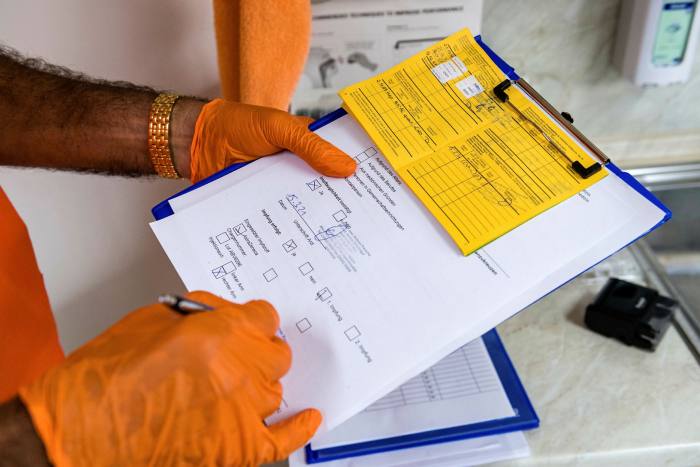Germany and France are among the growing list of European countries to have suspended or limited use of the Oxford/AstraZeneca coronavirus vaccine after reports of possible side-effects including several incidents of blood clots in people that had received the shot.
The European Medicines Agency and the World Health Organisation have said there was no evidence so far that the severe adverse events, including at least five deaths, were caused by the vaccine but national governments have taken precautionary action regardless.
Even if no link is proven between the vaccine and the incidents so that vaccinations restart, experts have warned the suspension is likely to damage already fragile public confidence in the AstraZeneca shot.
Which countries have taken action and why?
At least ten European countries have suspended or limited vaccinations. Austria moved first, halting the use of a single batch of the AstraZeneca vaccine — ABV 5300 — on 7 March after one person, under the age 50, was reported to have died with blood clots after receiving the shot. Denmark, Iceland and Norway followed suit by halting AstraZeneca vaccinations altogether last week after further so-called thromboembolic events, including the death of one woman in Denmark.
Germany, France, Italy, Spain and the Netherlands, suspended all use of the shot on Monday. Dutch authorities said 10 cases of problems including possible thrombosis or embolisms had been reported by people who had received the jab. All the countries have described their actions as precautionary. Other countries, including the UK, are continuing with vaccinations.

What are thromboembolic events and how common are they?
A thromboembolic event occurs when the blood clots, preventing normal circulation. It can be fatal if, for example, the clot travels to the lungs. Many Western countries have a higher proportion of people considered to be at risk of blood clots because of ageing populations and a higher prevalence of underlying conditions. Several daily medications exist to lower the risk of clots forming.
Penelope Ward, a professor of pharmaceutical medicine at King’s College London who had reviewed data collected by the UK medicines regulator, said the number of reports of blood clots among recipients of the AstraZeneca vaccine was still comparatively low.
“In the UK, about 165 people a day might suffer a thrombotic episode, some of which will be fatal,” Ward said. “In contrast, the number of reports from the ongoing vaccine programme in the UK and EU, which includes [more than] 20 million individuals vaccinated to date, is just 37. By chance alone at least 15,000 such events might have been expected from a population of that size.”
What do the regulators say?
The European Medicines Agency and the World Health Organization have both said vaccination campaigns should continue and that the benefits of inoculation outweigh the current risks.
“As of today, there is no evidence that the incidents are caused by the vaccine and it is important that vaccination campaigns continue so that we can save lives and stem severe disease from the virus,” the WHO said.
Both the WHO and EMA have said they are probing the incidents and will issue reports on their findings. French president, Emmanuel Macron, said he expected the EMA to report findings on Tuesday afternoon and that France was halting the use of the AstraZeneca vaccine until then. The EMA said it has called a meeting on Thursday to discuss the results of its information gathering and any further action that needs to be taken.
Megan Ranney, a professor of public health and emergency medicine at Brown university, said the regulators would be examining whether the rate of blood clotting was higher among those that had received the vaccine than in the wider population; whether there could be another explanation for the blood clots; and whether there was anything that could increase the risk for this small subset of participants. At this stage there was “minimal biological plausibility” for why the vaccine could cause blood clots, she said.

What do the clinical trials and real-world data on AZ tell us about its safety?
There was no evidence of a problem with blood clots during the AstraZeneca trials, which found the vaccine was safe and effective. The most common side effects were minor issues frequently associated with vaccines, including pain at the injection site, fevers and fatigue.
There were two more serious adverse events that may have been related to the vaccine: one case of transverse myelitis, which is inflammation of the spinal cord, and one case of a type of anaemia, which destroyed red blood cells.
Since receiving emergency approval in the UK and EU, the vaccine has been administered to millions of people. The UK’s yellow card safety monitoring system has found that their overall safety profile is no different to what was seen in the clinical trial, and the number of suspected adverse reactions are at a similar level to other routine vaccines.
What will this mean for public confidence?
Public confidence in the AstraZeneca vaccine was already fragile, particularly in Europe, after mixed messages from European leaders about the efficacy of the vaccine among those over 65.
Angela Merkel, the German chancellor, warned last month that the AstraZeneca vaccine had an “acceptance problem” — and concerns, even unfounded, about possible serious side effects can only make that worse.
David Spiegelhalter, chair of the Winton Centre for Risk and Evidence Communication at Cambridge university, warned of the risk of jumping to conclusions, adding that the crucial issue was whether the vaccine is doing more good than harm.
“Of course a possible link should be looked at very carefully,” he said. “But we must be wary not to assume one event caused another, just because one followed another.”
https://news.google.com/__i/rss/rd/articles/CBMiP2h0dHBzOi8vd3d3LmZ0LmNvbS9jb250ZW50L2UxYTk5ZjRmLTcwYWQtNDQ3Ny1hMzY2LTUzYTdjYjU5MDBkNtIBAA?oc=5
2021-03-15 20:57:56Z
52781434532640
Tidak ada komentar:
Posting Komentar